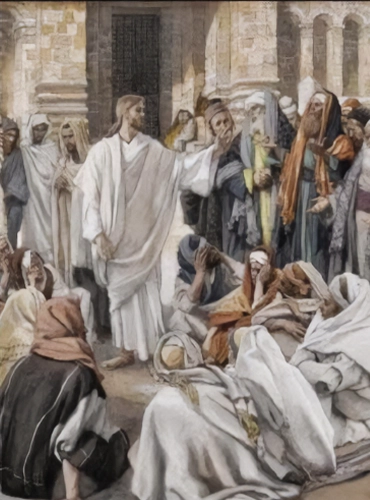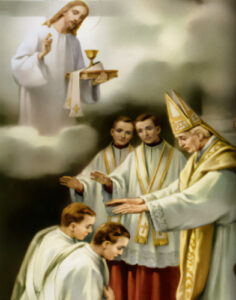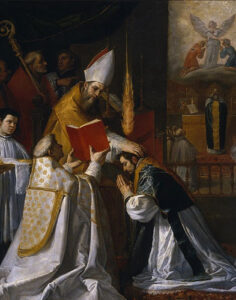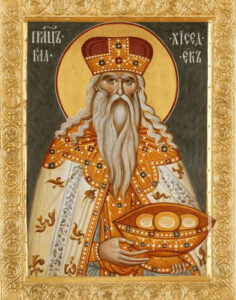Thirtieth Sunday in Ordinary Time – Year A
Ex 22:20-26, Ps 18:2-3, 3-4, 47, 51, 1 Thes 1:5c-10, Mt 22:34-40
Today’s readings emphasize two themes that, at first, we might think are very different or are far removed from one another: first, we have the theme or the idea of laws and commandments, as the first reading gives us a list of acts to be avoided: the Lord says “You shall not molest or oppress an alien. . . . You shall not wrong any widow or orphan. . . . You shall not act like an extortioner.” Here, the Lord is giving the Israelites a detailed list of things that are to be avoided in order to show love for their neighbors.
The Psalm and the second reading present us with a second and different theme, the idea of love, especially of love for God. The Psalm’s refrain is just that: “I love you, Lord, my strength,” and recounts all the great deeds the Lord has done. Likewise, in the second reading, Saint Paul joyfully tells the Thessalonians, “You became imitators of us and of the Lord . . . [and] so . . . you became a model for all the believers.” We become like what we love, and Saint Paul is rejoicing because the Thessalonians became like Christ, meaning, they really love Him, and love Him enough to imitate or copy His life in theirs. We become like what we love.[1]
These two seemingly unrelated themes are joined in today’s Gospel, as a scholar of the law asks Jesus “which commandment in the law is the greatest,” and Christ replies with two commandments. Both commandments concern love, showing us that there is no contradiction between the law and love. To understand this better, let’s consider, first, the historical context in which this dialogue takes place, second, the commandments that Christ gives and their importance, and, lastly, how we can apply this teaching to our lives. So the history, Christ’s words, and how to apply them to our lives.
First, discussion of the greatest commandment in the Law was subject to much debate in Christ’s time. In fact, it was a centuries old question, because scholars had found 613 commandments in the Law: 248 were positive, meaning, commanding that something be done, and 365 were negative, meaning, they prohibited or forbade some action. To make things easier, these commandments were divided into greater and lesser, saying you had to fulfill the greater ones, but the lesser ones you could ignore. Still, that’s a lot of commandments to sort through and obey.[2] This is the reason why the scholar asks his important question: “Which commandment in the law is the greatest?” or, more literally, “What sort of commandment in the law is great?” Is it a negative commandment, something we shouldn’t do? Or is it something positive, like a particular good deed?
In His reply, our second point, Jesus gives a beautiful answer that takes us to the heart of commandments, the reason why we have the commandments in the first place. There are two things that we should notice: first, the commandments Jesus gives are positive commandments, meaning, He tells us to do something. When it comes to what is most important, Christ didn’t tell us not to mess things up, or not to sin, or anything like that. No, He tells us to love God, because if we do that, then no matter what happens, even if we fall into sin, even if we really mess things up, we know that we can turn back to God.
This is what Christ says over and over again. At the Last Supper, right before His betrayal, passion, and death, in His last words to His closest friends, He will say, “If you love Me, you will keep My commandments” (Jn 14:15). If you love Me, then you will keep my Commandments: love comes first, and, because we love, we follow the rules. Love is the foundation of the Commandments, and they can’t be separated from it without distorting them and without having them lose their reason for existing in the first place.
Sometimes we can think of our faith as just a long series of “no’s”: no to this thing, no to that thing, and so on. We might think of it as a long list of negative laws. However, if we see it this way, then we’re really missing the point. Both Pope Saint John Paul the Second and Fulton Sheen explained our faith as one big “yes”: a yes to loving God and working with Him in our lives. From that “yes,” there are certain “no’s” that follow as a consequence.[3]
For example, if a man decides to marry a woman, on their wedding day he promises to love her exclusively and faithfully until the end of his life. In his yes to his wife, he has to say no to all the other millions of potential wives out there. Of course, all those no’s aren’t really what matter: he’s not thinking about how he has to say no to Suzie, to Cheryl, to Julia, and so on. What he’s thinking about is being united to the one he loves so much that she makes all the others pale in comparison, the only one who is so worth having, that she’s worth giving up everything else for. This is what our love for God needs to be like.
Here, then, Jesus is telling us that we need to love God, and love our neighbor. This gives our actions the right orientation; we’re not doing things as a mere obligation, or simply to avoid a punishment. We do it because we love Him, and we don’t want to displease Him. However, as a consequence of loving God, we must turn away from those things that offend Him, since our “yes” to God implies some “no’s” to the things that displease Him.
Christ’s teaching avoids the two possible extremes: it’s not just the external action that matters, since this can be done without loving God. However, loving God also means following His commandments and His teachings; in our yes to God, we must say no to those things that displease Him.
Secondly, these two commandments that Jesus gives us are connected: you can’t love God and hate your neighbor. Likewise, it’s “only when we love God, that [our neighbor] becomes lovable.” Man is made in God’s image and likeness, and it is for this reason that we can love Him. We could say we love him “in God,” loving God through him, despite the difficulties or challenges we might face in loving them. No one less than Saint Thérèse of Lisieux, the doctor of the Church, wrote that she struggled to love one of her sisters in the convent. So, to work against her dislike, she always smiled at her. One day the sister asked “Would you tell me, Sister Thérèse of the Child Jesus, what attracts you so much towards me; every time you look at me, I see you smile?” In her diary, Thérèse wrote “What attracted me was Jesus hidden in the depths of her soul.” The love of God is the foundation of our love for our neighbor.
This has consequences for our lives, our third point. We become like what we love: if we love God above all things, we become like Him and find the strength and grace to love those around us, no matter how difficult that might be. If we love the things of this world, though, then we become like them. The love of God must be the foundation of our lives, and, from there, it overflows into every other aspect, especially our love for our neighbors. The Servant of God Dorothy Day puts it bluntly: she wrote “I really only love God as much as I love the person I love the least.” “I really only love God as much as I love the person I love the least.” The opposite is true too, “the barometer or thermometer of my love of anyone is how much do I love God,” because a true love of God shows us the right way to love others.
We can ask ourselves: how well do I love my neighbors, especially the people that are hardest to love? Whom do I love the least? Is there anyone I need to forgive in my life? Is there something that prevents me from loving God with all my heart, soul, and mind? How can I get rid of it?
Through the intercession of Mary, Mother of Divine Love, let us ask for the grace to love God with all our heart, with all our soul, and with all our mind, and to love our neighbors as ourselves, just as she did.
[1] Cf. Saint Augustine, Second homily on 1 John: “Because such is each one as is his love. Love earth, you shall be earth. Love God, what shall I say? You shall be a god?”
[2] Cf. Warren W. Wiersbe, The Bible Exposition Commentary (Colorado Springs: Cook Communications, 2001), 81.
[3] Saint John Paul II uses this analogy in Love and Responsibility, and Sheen in Three to get Married (I think). JPII writes: “The virtue of chastity is emphatically not a ‘no,’ but a great ‘yes’ to the person and to true love.”







